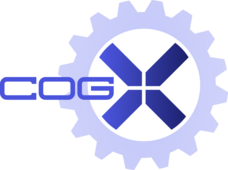This scientific project is concerned with trying to address the second challenge in the ICT part of FP7 on Cognition, Interaction and Robotics.
The starting point
The challenge is to develop cognitive systems (e.g. robots) that are able to work in open ended, challenging environments, dealing with novelty, uncertainty and change. The starting point for CogX was the recognition that two key elements necessary for such cognitive systems have made progress in recent years. The first is that the range and power of available learning methods has advanced significantly, with specific advances based on these in certain domains, such as computer vision, or human augmented mapping. The second is that we have made progress in the engineering science of building integrated robotic systems that incorporate multiple modes of sensing and acting. Examples of the latter include a raft of robotic systems in the past four years that combine mapping, manipulation, vision, language, planning and learning. What is missing, and thus what we must build upon these advances, is a clean way of thinking about how agents such as robots should understand their own abilities and knowledge (self-understanding), and choose which of their abilities or knowledge to extend at any one time (self-extension). If we had a framework for self-understanding and self-extension for a robot or cognitive system then we would have taken a significant step along the road to achieving the aim of building systems that can handle the types of environments specified in the call.
Our aims
The high level aim of the project is to develop a unified theory of self-understanding and self-extension with a convincing instantiation and implementation of this theory in a robot. It is important to note that the aims of the project are neither to produce a complete theoretical framework for self-understanding and self-extension that remains unimplemented in a robot, nor to merely create further specific algorithms for robot learning. Instead our goal is to build a bridge between these two, by creating a framework that is convincingly instantiated and studied in robot systems. This will require specific advances in the areas of mapping, language, and manipulation. But the overall way we will tie these advances together within a framework is as important.
A technical summary
Our basic insight is that for any class of representations (e.g. logics, probabilistic models, dynamical systems) that a cognitive system might use it is possible to represent uncertainty or incompleteness in the agentÕs knowledge that is encoded in those representations. There has been much effort in developing these, notably in work on epistemic logic or probabilistic learning and reasoning. What we will do is to develop methods for generating and reasoning about such representations for a robot with a number of specific sub-systems (language, spatial modelling and mobility, manipulation, vision), and to develop methods for combining the uncertain beliefs from each subsystem, so that the robot can for example reason about what information or knowledge gathering activities it should next engage in so as to achieve its task or learn about the world. This could be, for example, whether it should next learn about how to grasp the new cup in front of it, or explore the room next door to complete its map, or ask a person questions about the properties of the objects it can see. Only by being able to reason about the effects on its knowledge state can the robot plan what it should do to acquire new knowledge. We will both pull existing strands of work on representing beliefs and uncertainty in knowledge together, and make advances in each of the domain specific areas. These will be as important as the framework that connects them.
The wider benefits of this research
There are numerous applications for flexible and robust robots and cognitive systems including space and ocean exploration, work in hazardous or unpleasant environments, and assistance in the home, offices or factories. The primary impact of this project will be that it will be another step on the long road to cognitive systems that will inhabit our everyday world. Progress is slow but steady, and many of these technologies are already being exploited. With each advance a wider range of applications becomes possible. The primary impact of the project will be scientific, but we will make as much of our work as possible publicly available to encourage commercial exploitation.
Partners
University of Birgmingham, United Kingdom (Co-ordinator), DFKI GmbH, Germany, Kunliga Tekniska Högskolan, Sweden, Univerza v Ljubljani, Slovenia, Albert-Ludwigs-Universität Freiburg, Germany, Teschnische Universität Wien, Austria


